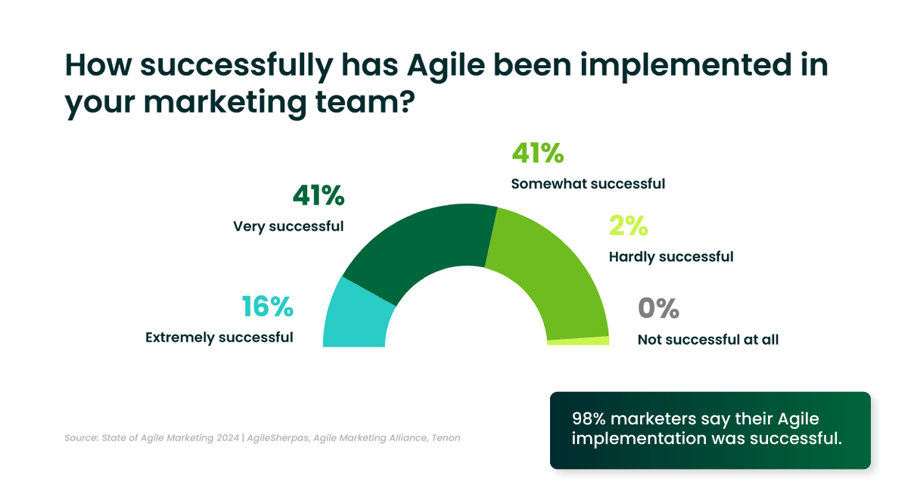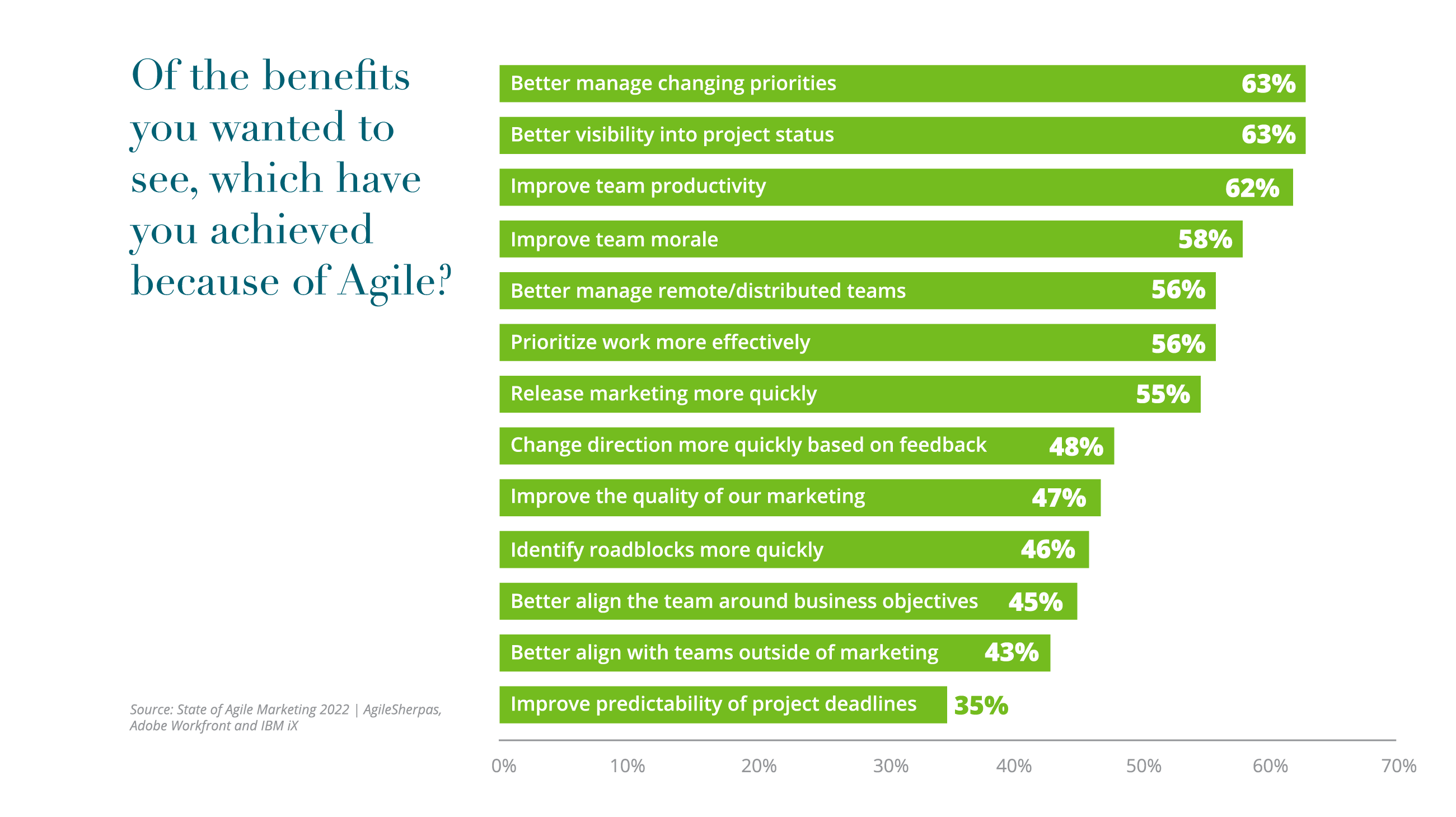In today’s landscape, marketing agencies need every advantage they can get. So it’s hardly surprising that Agile marketing agencies have become industry leaders. However, understanding the rise of the Agile marketing agency requires diving into the data behind that success.
That data tells some important stories: about how agencies can serve both their clients and their own team members; about how they can adapt to the realities of remote work; about how they can embrace innovation; and much more.
What Is Agile Marketing?
First, in case you’ve managed to completely miss the trend, let’s understand just what Agile marketing is.
Agile marketing applies the principles laid out in the Agile Marketing Manifesto to reimagine how marketing operates., firstly by focusing marketing around delivering value to stakeholders (both internal and external), striving to gather feedback from them to understand their needs. Armed with that information, Agile marketing agencies can focus on work that really matters.
Then there are the processes that drive that value. Work is broken down into shorter bursts that enable teams to test ideas, iterate processes, and generally build a culture and mindset of continuous improvement. This breakdown also enables teams to avoid big-bang campaigns that pour weeks or months of work into something before it can be tested and validated.
As a result, Agile marketing agencies prioritize responding to change and feedback over following a rigid plan, eschewing silos and hierarchies to remain flexible and adaptive. The results of this approach are transformative.
Agile Marketers are More Satisfied and Confident
Confidence and satisfaction are two dramatically underrated metrics for marketing success. An agency can have a lot going right, but if its marketers are dissatisfied and don’t feel confident in their work, they’re simply not going to perform well.
The data gathered in the 2024 State of Agile Marketing Report found that 98% of marketers reported the Agile implementation on their team as successful. It also found Agile marketers are more likely to feel energized about their work and feel its impact on business goals is clear to leaders and clients alike.

Looking at the numbers, most Agile marketers feel they can produce high-quality work, release that work quickly, and prioritize what matters. The picture as a whole is one in which Agile marketers simply feel better about their work, in large part because its value is clear.
Agile Marketers are More Prepared for Remote Work
Recent years have obviously seen a massive shift towards remote work for most marketing agencies. While some marketers are heading back to the office, remote work looks poised to retain popularity with marketing agencies around the world.
It’s no wonder, as one study from HiveDesk found, that 80% of marketing agencies felt remote workers increased productivity while a full 20% were fully remote.
This has further fueled the move towards Agile. When marketers go remote, it often becomes more difficult to coordinate and ensure everyone is on the same page. Not to mention the increased difficulty of seeing how your work is contributing to larger goals.
Agile addresses this directly with common elements like daily standups and tools for workflow visualization like Kanban boards to empower marketers with the context they need.
All of this makes the kind of asynchronous and independent work that more marketers prefer far easier.
Agile Marketers are More Productive
The average marketing agency has between 16 and 19 clients, not to mention the hundreds or thousands of customers they might deal with through those clients. It’s no wonder agencies are turning to remote work and Agile marketing to enhance productivity in order to handle those workloads. After all, the economic uncertainty of recent years made the ability to adapt and maintain productivity more important than ever.

This year’s Agile Marketing Report showed just how true that is, with data showing that Agile marketers felt they were better at managing changing priorities, had better visibility into project status, were more productive, had better morale, and many more. Across the board, it was found that Agile marketers performed better than their traditional and ad hoc counterparts.
For Agile marketing agencies, these benefits translate into teams that are better able to handle multiple projects in fast-moving environments.
Planning Iterations and Speed Increase
Agile marketing is built around faster iterations to quickly identify and implement new ideas, but this extends beyond simple standups to how overall marketing planning happens.
Majorities of Agile marketers reported being able to prioritize the most important work and release that work more quickly. This advantage was crucial because the single greatest marketing challenge respondents reported (by an enormous margin) was too many last-minute requests.
Agile marketing agencies are better equipped to handle such requests, sure, but they have another more important advantage. By working more closely with their clients and stakeholders, they can reduce the number of such requests to begin with. Fewer last-minute requests means more time for marketers to get creative, produce quality work, and still enjoy healthy work-life balances.
It also discourages wasting resources simply because they were allocated a certain way months ago.
Overall, by shifting to smaller and more frequent planning cycles, Agile marketing agencies are able to serve their clients more effectively and efficiently.

Agile Marketing Agencies Are More Focused on the Impact for Stakeholders
One of the biggest struggles any marketing agency faces is retention. It’s no secret that whether in a B2B scenario like a marketing agency or in a typical B2C one, retaining a customer is far cheaper than finding a new one.
If you want better retention, you need to clearly demonstrate your value to those clients. This is another area where Agile marketing agencies have a clear advantage. By remaining laser-focused on identifying client needs and iterating around how to meet those needs, Agile marketing agencies can deliver more value more quickly.
All of this ties back to one of the guiding principles that drives Agile marketing agencies: outcomes over outputs.
In other words, instead of hearing about what was done (we published so many articles!) clients hear about what the effects were (your KPIs or OKRs moved by X%). This Agile-driven focus on stakeholder value as the primary way to measure marketing effectiveness is ideal for improving retention by consistently demonstrating value.
Agile Marketing Agencies Can Attract More Clients
Our annual reports have long shown that Agile marketers find it easier to work with other departments if they also follow an Agile methodology. This strong preference also extends outwards, as companies which use Agile find it easier to work with marketing agencies that do the same.
However, the reasons why Agile companies are attracted to Agile marketing agencies are just as important. Knowing that an agency shares a similar structure of work, focus on stakeholder value, and general mindset makes choosing that agency far less risky. It’s no wonder agencies prominently advertise their Agility when describing how they work.
Just as important is which sectors are more likely to use Agile. In particular, as Agile expands outside of its software development roots, it’s been adopted by more innovative and dynamic companies. For any marketing agency, these are dream clients, companies set to develop better products and services through a rigorous focus on providing value to their end-customers as opposed to companies stuck conducting business the way they did in the 90s.
Unlocking the Competitive Benefits of Agile Marketing Agencies
There’s no getting around the advantages Agile marketing agencies have in today’s competitive global environment. From being more appealing to top customers to enjoying greater confidence and effectiveness, Agile is fast becoming a key ingredient in creating a successful marketing agency.
However, accessing those benefits requires a solid foundation of Agile knowledge and experience. To build that foundation for yourself, you can access all the information you’ll need in our purpose-built online learning platform The Ropes. It’s specifically designed to enable everyone from individual contributors to marketing leaders to access practical lessons for applying Agile ways of working to their everyday marketing challenges.